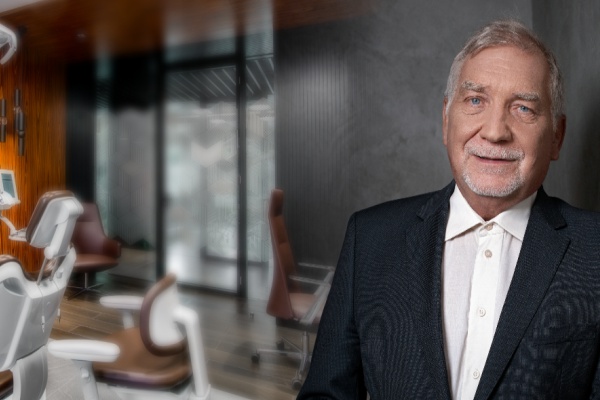Experienced dentist and chief specialist at the Ostrava-based private clinic and dental emergency AJNA, Lubomír Beran, welcomes every innovation in his field. When he learned about the effects of molecular hydrogen on the body, he didn’t hesitate to try it on himself and immediately applied it to patients at the clinic, expressing his enthusiasm. “I see and feel for myself that these products are excellent.”
Running a successful dental-aesthetic center in Velký Třebešov, with 40 years of experience focusing on dental surgery and implantology, combined with a kind and professional approach and an unwavering desire to help people achieve quality dental health, 72-year-old dentist MUDr. Lubomír Beran smiles and says that he has no intention of retiring. “My friends ask me why I’m not already retired, and I tell them: are you crazy? I’m only halfway through my life! I need to live to be 150 years old! And I know I will! New activities keep coming up that I want to do, and that awareness gives me strength! Telling people this keeps pushing me forward because I want to keep convincing them that I will make it. That’s my driving force, even though I know my body is worn out.”
Ostrava’s Teeth? Neglected
When the renowned dentist started treating teeth in Ostrava, he was surprised by how poor their condition was. Based on their teeth, he often estimated patients to be 20 years older than they were. “The most common problem is highly neglected teeth. When people finally feel pain, they scramble to save some money and come to us. There are very few people who come to us with just two or three minor issues. Those patients make me happy.”
Unfortunately, most new patients at the AJNA clinic hadn’t seen a dentist for up to seven years, only realizing when their dentist retired or removed their file, and pain caught up with them. Suddenly, they need to deal with their teeth urgently and are willing to invest in removing the pain and ideally saving their natural teeth. However, by this time, their dental condition has deteriorated catastrophically, according to Beran. “When we do a CT scan, we are horrified by what we find. With such patients, two-thirds of their teeth often have to be removed, some can be saved, or we find one or two good teeth, which isn’t worth it. So we remove everything, make removable dentures, and after a period of healing, we can proceed with the prosthetic plan.”
Supportive Hydrogen Therapy
This is when patients at the Ostrava clinic encounter molecular hydrogen. “If we agree to extract, for example, an entire jaw, it’s clear that the patient will then have a large wound. Afterward, we apply hydrogen, which greatly helps with the large defect. I’m fully convinced of its benefits. It quickly helps heal the wound and reduces pain. Patients really tell us the day after the procedure that they felt almost no pain. Which is excellent, it’s a one-time application, and it helps this way.”
The dentist is very pleased with molecular hydrogen products and plans to use them more extensively. “I see and feel for myself that these products are excellent. We test them on patients, and we have a hygienist who has the entire hydrogen arsenal, explaining it to people, and if they are interested, she sells them these products. For patients who have undergone more complicated procedures, like an extraction of a wisdom tooth, we send them to our hygienist after the procedure, where they relax with music and inhale molecular hydrogen for half an hour,” says the dentist enthusiastically.
“It’s still in its early stages, but I’m considering setting up a dedicated room where people from all our offices can come after their procedures—let’s face it, every procedure at the dentist is stressful—relax, and inhale hydrogen.” Stress is one of the reasons free radicals multiply. According to current knowledge, molecular hydrogen keeps free radicals in balance with positive antioxidants. “I was introduced to hydrogen through our partner organization, H2 Global Group, with whom we are working on very interesting joint projects that will allow us to help people even more effectively. They told me that molecular hydrogen has a significantly positive effect on the nervous system, stabilizes it, rejuvenates the body, supports immune system function, and tangibly helps overcome stress.”
The Near and Far Future of Dentistry
MUDr. Lubomír Beran believes that, thanks to hydrogen, he will be able to help his patients for another 50 years. “Today’s world is very hectic, people sleep little and eat poorly, which contributes to our bodies being poorly balanced. Fortunately, there are people who come up with ways to heal or help not just with medications, which often have side effects that then need to be addressed with more drugs, but with natural or supportive treatments, and hydrogen is one of them.”
Currently, the dentist, along with a team of other dentists, is dedicating a significant amount of time to setting up up to 300 new dental offices to ensure that everyone in the Czech Republic has access to a dentist and quality care covered by insurance. Together with his colleagues, he has also succeeded in ensuring that dentists in the Jeseník region, where access to dental care is a major problem, treat children in schools, as was once the case. “It was incredibly difficult to navigate the legislation and get all the necessary consents to even be able to treat the children, but we managed it, and I’m very happy about that,” concludes Dr. Lubomír Beran.


